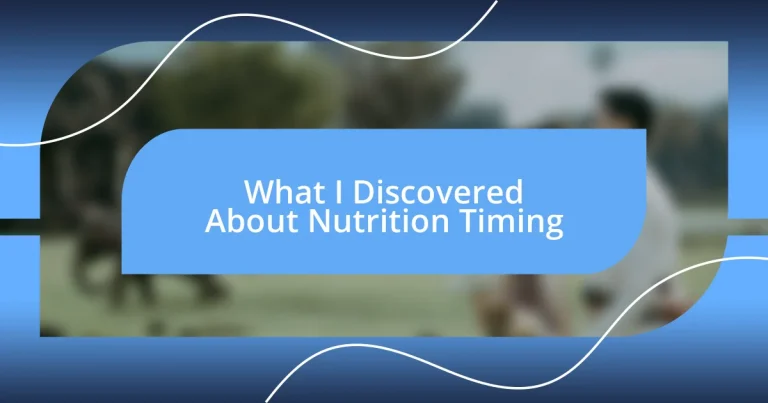Key takeaways:
- Nutrition timing greatly impacts performance and recovery; consuming carbohydrates pre-workout and protein post-workout enhances energy and muscle repair.
- Spreading meals evenly throughout the day stabilizes energy levels and aids in maintaining focus, while individual preferences play a crucial role in effective meal timing.
- Common myths about meal timing, such as needing to eat every few hours or strict post-workout windows, can often be debunked by listening to one’s body and prioritizing intuitive eating over rigid rules.
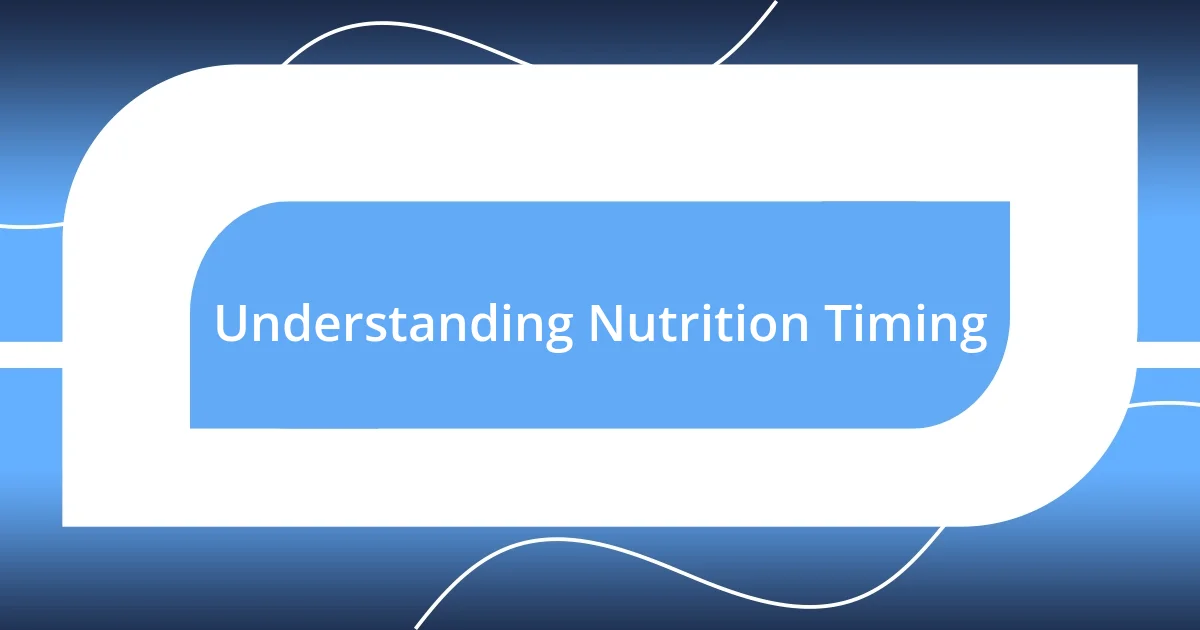
Understanding Nutrition Timing
Nutrition timing is about optimizing when you eat to maximize performance and recovery. I remember a time when I started paying attention to my meal schedule around workouts. The difference was palpable; I felt energized during my sessions, which made me wonder—how often do we ignore the timing of our nutrition and only focus on what we eat?
It’s fascinating how certain nutrients can have varying effects based on when we consume them. For instance, I’ve experienced a notable boost in my energy levels since incorporating carbohydrates before and protein after workouts. Have you ever noticed how your performance fluctuates or how you feel during the day based on your meal timings? This realization helped me understand that it’s not just the food itself but also the timing that can significantly impact my results.
In my journey, I discovered that understanding my body’s signals is crucial for effective nutrition timing. Listening to when I felt hungry or when fatigue set in taught me to align my meals with my lifestyle. It’s a learning process, but there’s something empowering about consciously choosing when to fuel my body—doesn’t that make you rethink your own eating patterns?
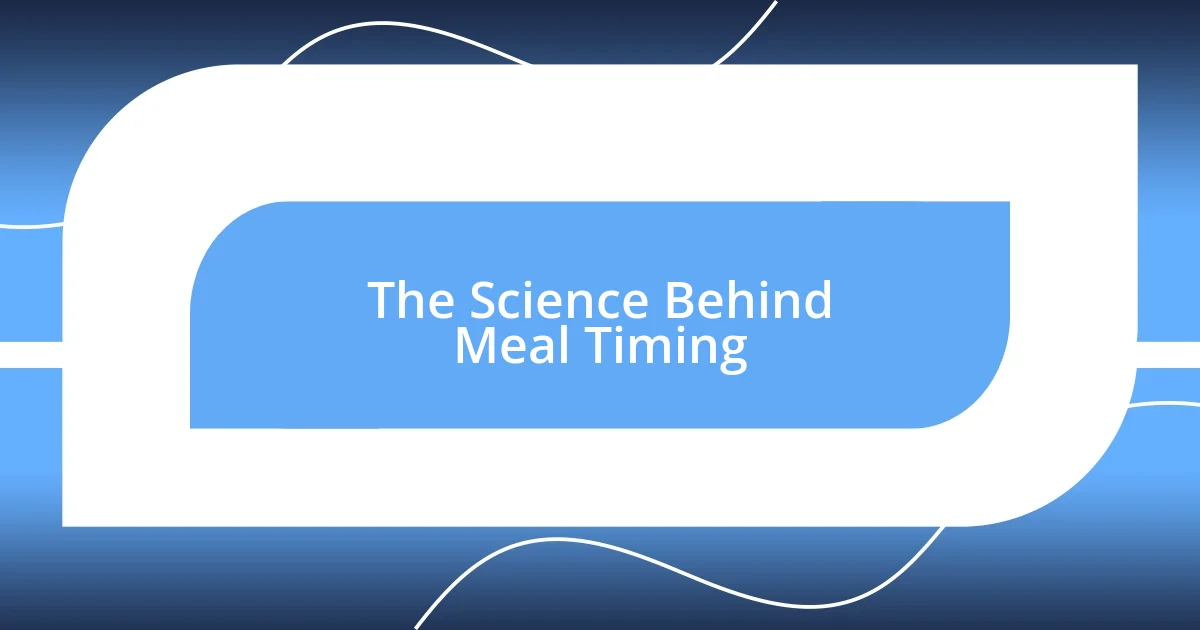
The Science Behind Meal Timing
The timing of our meals has been shown to significantly influence metabolism and energy levels. For example, I noticed that having a high-carb meal within an hour after working out made a difference in my recovery speed and muscle soreness. This aligns with research indicating that post-workout nutrition is crucial for muscle repair and glycogen replenishment.
I also learned that spreading meals evenly throughout the day can help maintain stable energy levels. In my experience, having smaller, balanced meals every few hours kept my focus sharp, especially during that mid-afternoon slump. It’s intriguing how our bodies thrive on routine, and understanding this rhythm can be a game changer in achieving our health goals.
Interestingly, my experimentation with intermittent fasting revealed that not everyone reacts the same way to meal timing. While some people experience heightened mental clarity and energy with this approach, I personally found I had better results when I ate more frequently. This goes to show that finding the right meal timing ultimately depends on individual preferences and responses—what works for one may not work for another.
| Meal Timing | Effects on Body |
|---|---|
| Pre-Workout | Enhances energy and performance |
| Post-Workout | Promotes recovery and muscle repair |
| Evenly Spaced Meals | Stabilizes energy and focus |
| Intermittent Fasting | May increase mental clarity for some |
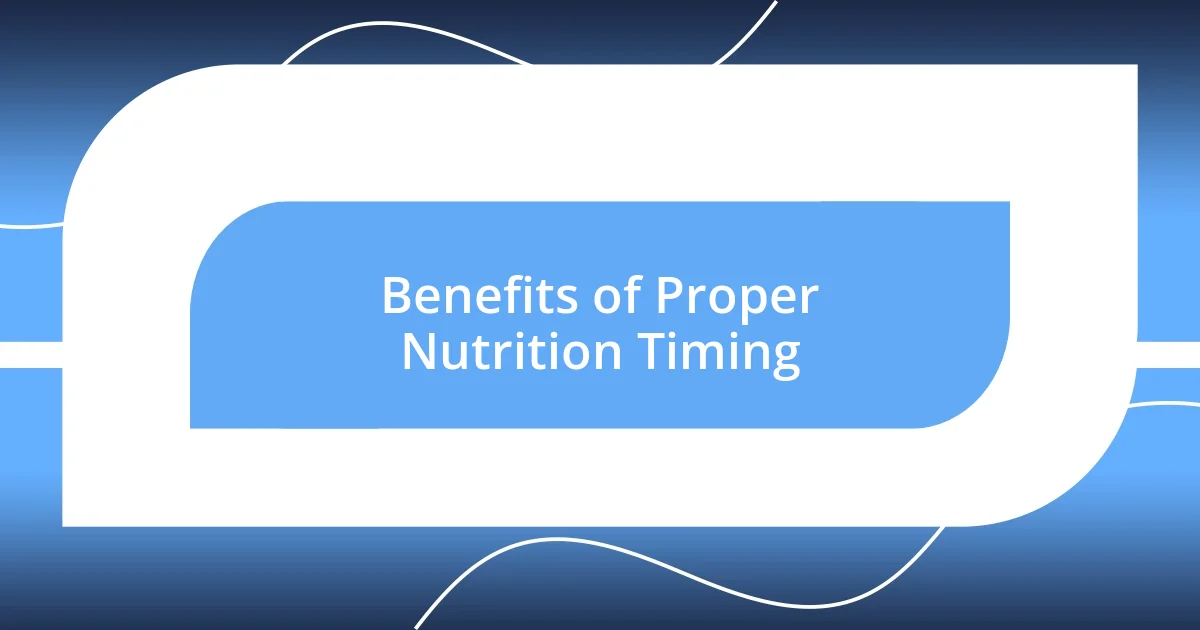
Benefits of Proper Nutrition Timing
Proper nutrition timing has really transformed my approach to wellness. I’ve felt an undeniable difference when I eat strategically around my workouts. For example, I remember a week when I focused on eating a balanced meal shortly before heading to the gym. The energy surge I experienced was incredible—it was as if I had unlocked a new level of performance.
Here are some notable benefits I’ve discovered regarding nutrition timing:
- Improved Energy Levels: Eating carbs before exercise significantly boosts my stamina.
- Enhanced Recovery: Consuming protein right after a workout shortens the soreness period, making me more prepared for my next session.
- Stable Blood Sugar: I’ve noticed that spacing meals out helps me avoid those frustrating energy crashes during the day.
- Mental Clarity: Eating at regular intervals maintains my focus and keeps my mood even, which has been especially helpful during long workdays.
Finding the right timing has turned eating into an experience rather than just a necessity, and I hope you explore this too! Through this process, I’ve felt more in control of my physical and emotional well-being. Isn’t it amazing how something as simple as timing can make such a profound impact?
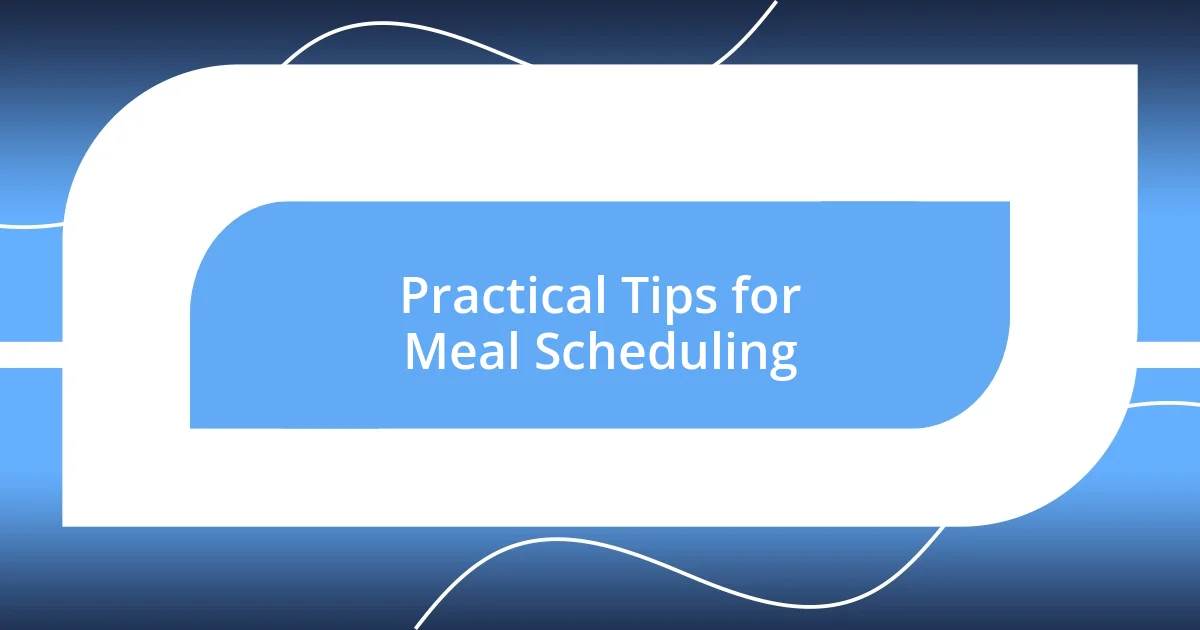
Practical Tips for Meal Scheduling
It’s incredible how a little planning can transform your day. When I started scheduling my meals more deliberately, I noticed that my energy levels were far more consistent. For instance, instead of waiting until I was starving to eat, I began setting reminders on my phone to have snacks at regular intervals. This small tweak helped me avoid those overwhelming hunger pangs that often left me feeling sluggish.
I’ve also experimented with meal prepping, which has been a game changer. By setting aside a couple of hours each weekend to prepare my meals for the week, I can ensure I have balanced options ready to go. I recall one particularly busy week where I had pre-made salads and protein packs that kept me fueled. It felt great knowing I was nourishing my body, even on hectic days! Have you ever considered how much easier life becomes when you have healthy meals at your fingertips?
Lastly, keeping an eye on my meal timing around workouts has become essential. I remember struggling through workouts without proper fuel until I discovered that having a light snack about 30 minutes before hitting the gym made a huge difference. I’d feel energized and ready to push my limits rather than dragging my feet. Tuning into what your body needs and experimenting with timing can yield wonderful results in performance and overall well-being. What do you think? Isn’t finding that sweet spot for your meals worth the effort?
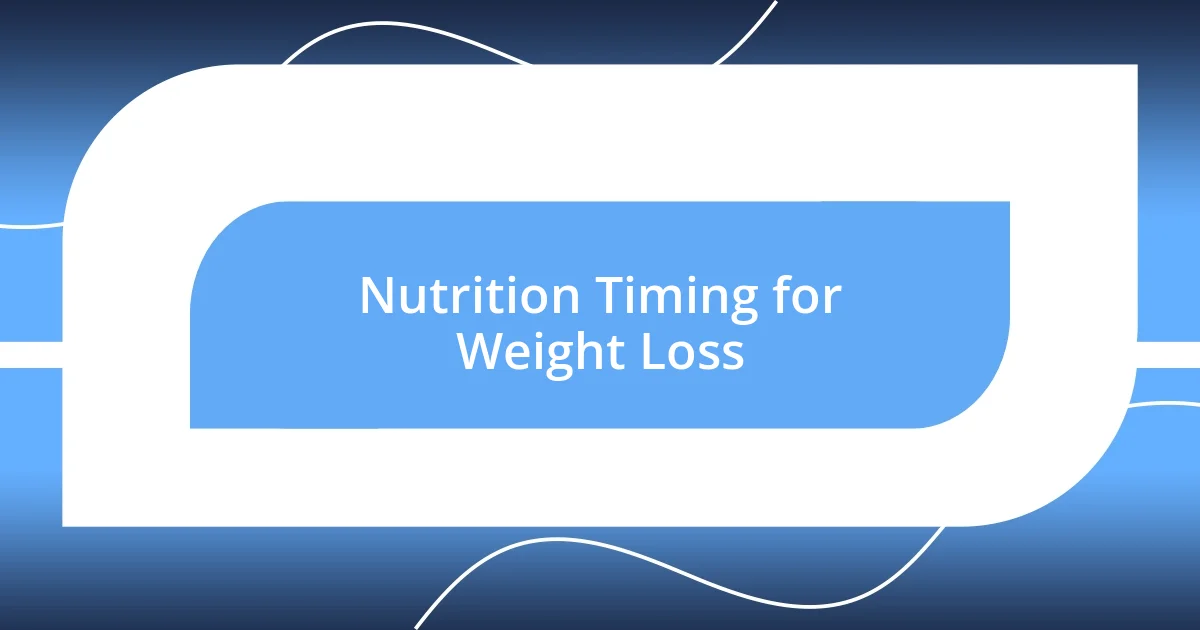
Nutrition Timing for Weight Loss
When it comes to weight loss, the timing of my meals has been pivotal. I recall a time when I decided to eat my largest meal in the morning. It felt unconventional, but as I powered through my busy days, I noticed I wasn’t as tempted to snack mindlessly later on. Have you ever experienced that satisfying feeling of being full and focused? It made me realize how such changes could support weight loss without feeling deprived.
I also learned that spacing my meals at regular intervals keeps my metabolism humming. There was a week when I adopted the practice of eating every three hours. I felt lighter and more energetic, which was a refreshing change. This rhythm not only helped me stabilize blood sugar levels but it also curbed those late-night cravings that used to derail my progress. Have you tried breaking your meals down like this? It might just surprise you how much power you hold in simple changes.
Finally, I’ve noticed the benefits of eating my meals mindfully. I once participated in a lunch where we sat quietly, savoring each bite. It was eye-opening! Enjoying the flavors made me realize how much I could eat before feeling full. Have you ever taken a moment to simply appreciate your food? This practice has made a remarkable difference, not only in my relationship with food but also in supporting my weight loss journey. Embracing the timing and the experience of eating has truly been a game changer for me.
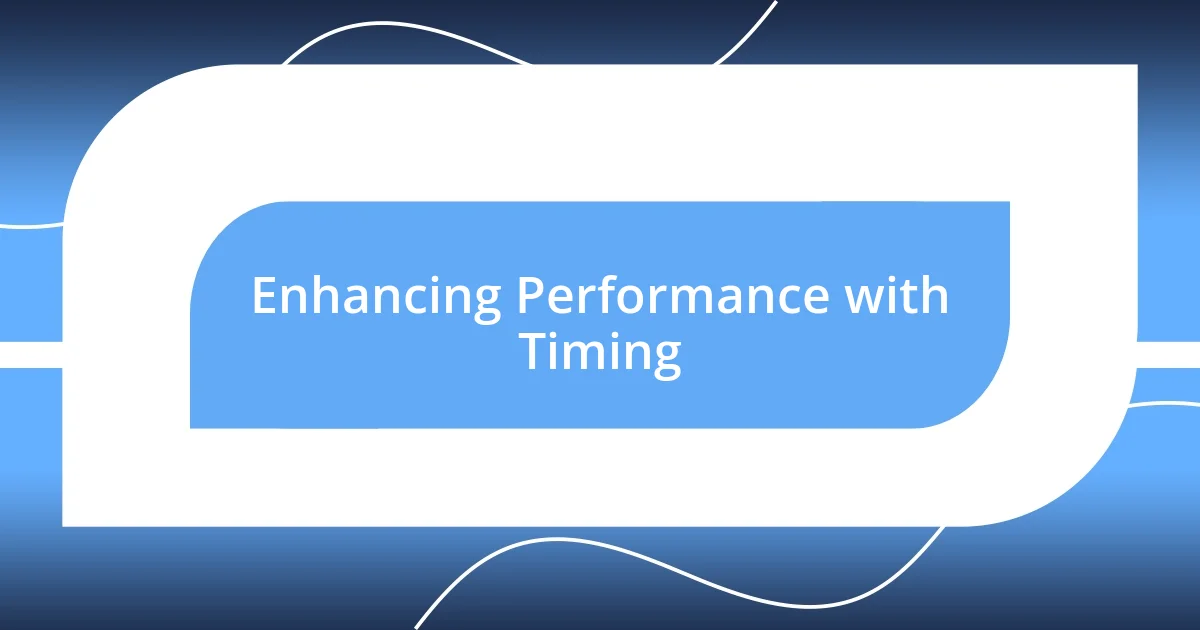
Enhancing Performance with Timing
Timing isn’t just about when you eat; it’s about how it can elevate your performance. I remember the first time I strategically timed my meals around high-intensity workouts. I had a small protein shake about 60 minutes before a challenging circuit. The result? I felt unstoppable—my energy surged, and I pushed through sets that usually left me gasping for air. Have you ever experienced that exhilarating feeling of being fully fueled when it matters most?
In my experience, post-workout nutrition can’t be underestimated. After a tough session, I made it a habit to refuel with a mix of protein and carbohydrates within 30 minutes. There’s something gratifying about chowing down on a recovery smoothie and feeling those nutrients working their magic. I noticed quicker recovery times and less soreness after workouts, which made me eager to get back to my routine. Isn’t it amazing how such intentional choices can expedite progress?
Reflecting on this, I also discovered that listening to my body has been instrumental in optimizing my performance. Recently, I took a moment to analyze my energy levels throughout the day. Mapping out when I felt most energetic led me to adjust my meal timing accordingly. It was eye-opening! Instead of a heavy lunch that made me sluggish, I opted for lighter meals during the afternoon, keeping my focus sharp. Have you considered how your body’s natural rhythms might guide your nutrition strategy?
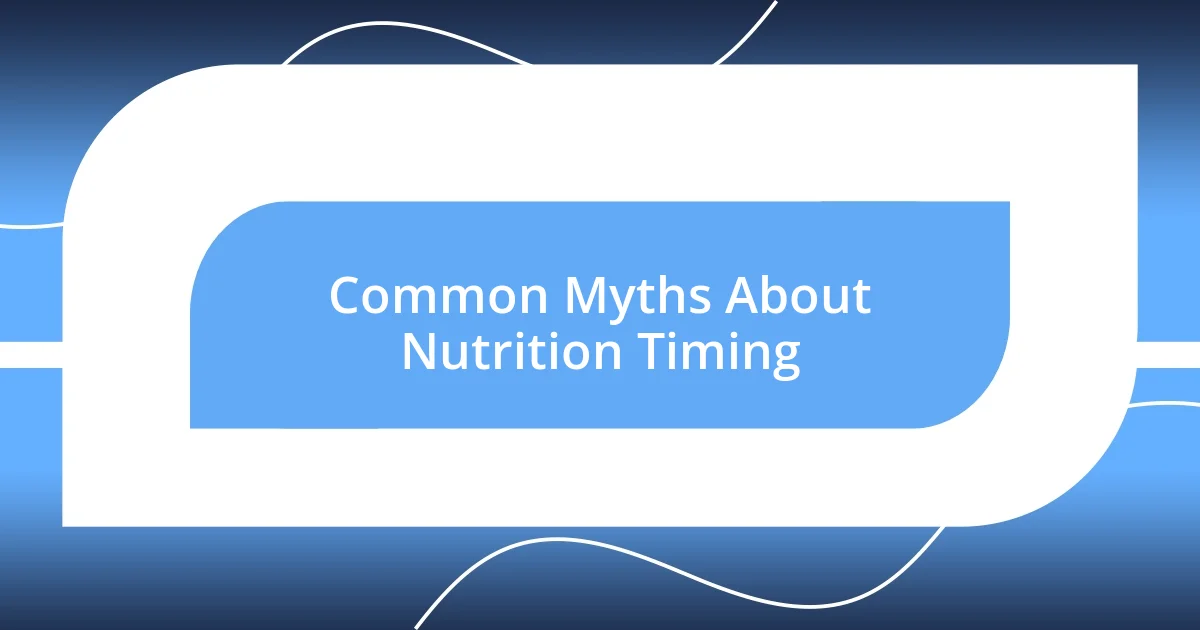
Common Myths About Nutrition Timing
I’m glad we’re diving into the myths surrounding nutrition timing; there’s so much misinformation out there. One misconception I’ve encountered is that you must eat every few hours to rev up your metabolism. I used to adhere to this belief religiously, but when I started trusting my hunger cues instead, I found that my body naturally regulated itself much better. Have you ever experimented with meal frequency? It can be surprising how flexible our bodies can be.
Another common myth is that there’s a strict window for post-workout nutrition. I remember feeling frantic if I missed that supposed 30-minute mark after exercising. After some trial and error, I realized that my body didn’t operate on a stopwatch. I often enjoyed my recovery meal an hour or even two later, and I felt completely fine. Have you noticed that some guidance feels more flexible than others? Finding your own rhythm is key.
Lastly, it’s easy to fall into the trap of thinking that all meals need to be perfectly balanced. There was a time when I stressed about including protein, carbs, and fats in every single meal. But then I discovered the joy of simplicity; sometimes, a piece of fruit or a handful of nuts does the trick. It’s about nourishment rather than perfection. Why do we overcomplicate things when it comes to nutrition? Embracing a more intuitive approach has truly been liberating for me.












